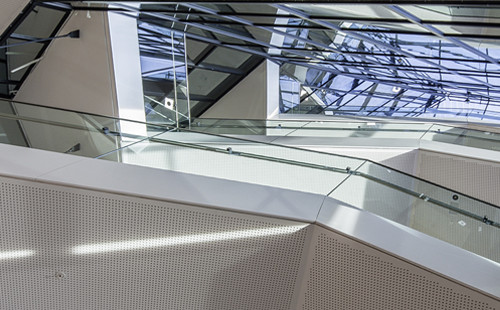Master Class CEE Insight Talks
The “Insight Talks” provide an informal discussion platform with corporate partners of the Master Class CEE and other guests on the topic of the research seminar. Executives of three multinational firms talked with the students of the MC CEE 2022-23 about the current management challenges in the region and their responses to the war in Ukraine, discontinued energy supplies, disrupted supply chains and high inflation.
Alexander Weiss, Head of Indirect Materials & Services, Group Procurement, MONDI Group talked about the shock of the further invasion of Ukraine and the painful process of withdrawal from Russia, representing 12% of total revenue and 18% of employees of the MONDI Group. After the Russian invasion of Ukraine on 24 February 2022, immediately the risk management plans were activated. Employee safety in Russia and Ukraine came first, then the focus shifted to keeping the operations running and an emergency & coordination team was installed including all functions and top-management. The risk management framework covered among other tasks the close monitoring of the legal frame of the EU and its allies sanctions against Russia as well as the supply of energy and raw materials. Building higher stocks, finding new suppliers and switching energy sources ranked high on the agenda. After more than 20 years of investment and market building, the sale of the operations in Russia with 5,300 employees was prepared and finalized
Michael Czech, Vice President CEE North & Marketing Henkel Consumer Brands CEE, HENKEL Group, described a global business environment characterized by disruptions and instability too. He pointed at the unprecedented and consecutive supply shocks since 2020 (six times more events than before 2020) and the resulting enormous increases in logistics, packaging and raw material costs. To secure supply lines Henkel shifted part of the purchasing volume from single to dual sourcing, and 80% of the supplies are now coming from within the region. The CEE countries are the hardest hit by the inflation in Europe with the Baltic countries leading (20%) followed by Czechia, Hungary and Poland with around 15%. CEE households on lower income nearly reached their financial limits. People buy less, choose cheaper stores, buy products on promotion and are ready to shift to lower priced brands. Less disposable income, cost increases of energy, raw materials and packaging and supply chain disruptions are affecting all consumer markets and, therefore, Henkel’s detergent, cosmetics and toiletries businesses too. Henkel counters with optimizing supply chain processes, cost reductions, price increases and innovations such as launching detergents being effective on lower temperatures.
Thomas Schatz, Head of Large Corporates, ERSTE Group Bank, provided a “big picture” on the topic. Erste Group Bank itself is not present in Ukraine and Russia but many of its corporate clients. He referred to the direct sanctions of the EU and the indirect ones via the US Department of the Treasury’s Office of Foreign Assets Control that affect European multinationals with relations to Russia and the difficulties to withdraw in highly regulated industries such as banking. More attention should be paid to industry and consumer confidence indices as lead indicators for the future economic development. The consumer sentiment was last fall on a record low predicting recessionary trends for 2023. The drastic fall in GDP growth rates from 5% and more in 2022 to 1% and below in 2023 contrasts with still low and barely increasing unemployment rates (3.3–6.5%) – a new phenomenon in economics. Latter is due to the labor and skills shortage plaguing also CEE. He defended Erste’s decision to focus on Central and Southeastern Europe by referring to the cumulative GDP per capita growth rates in the period 2007-22 of 16% (CZ) to 60% (ROM) which outperform Austria’s 4.5%. While the multiple crises are threatening future growth, on a positive note he brought up the EU funds. The NextGeneration EU funds will stimulate investments in the green transition and digitalization of the members’ economies. For instance, Poland has allocated funds of € 24 bn., half-sized Romania of € 14 bn. and small Croatia € 6.3 bn. Those funds will trigger investments in energy saving, emission reduction, recycling and modernizing of CEE economies and offer business opportunities in difficult times.
What are the lessons for mastering an uncertain future:
Entrepreneurship is needed more than in “normal times”.
Diversify your sources and markets to better absorb unexpected external shocks.
Ensure collaboration and transparency along all functions and the supply chain.
Think slow, act fast – you don’t have to find a comprehensive solution immediately, in a crisis the context is continuously changing and you gain new insights along this process.
Communicate clearly.
